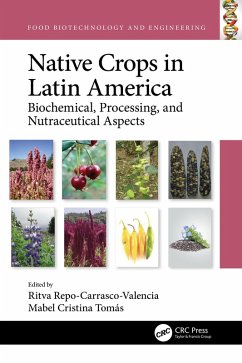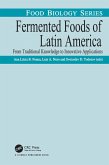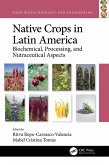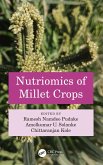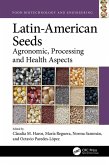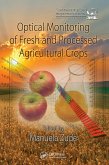Native Crops in Latin America (eBook, ePUB)
Biochemical, Processing, and Nutraceutical Aspects
Redaktion: Repo-Carrasco-Valencia, Ritva; Cristina Tomás, Mabel
67,95 €
67,95 €
inkl. MwSt.
Sofort per Download lieferbar

34 °P sammeln
67,95 €
Als Download kaufen

67,95 €
inkl. MwSt.
Sofort per Download lieferbar

34 °P sammeln
Jetzt verschenken
Alle Infos zum eBook verschenken
67,95 €
inkl. MwSt.
Sofort per Download lieferbar
Alle Infos zum eBook verschenken

34 °P sammeln
Native Crops in Latin America (eBook, ePUB)
Biochemical, Processing, and Nutraceutical Aspects
Redaktion: Repo-Carrasco-Valencia, Ritva; Cristina Tomás, Mabel
- Format: ePub
- Merkliste
- Auf die Merkliste
- Bewerten Bewerten
- Teilen
- Produkt teilen
- Produkterinnerung
- Produkterinnerung

Bitte loggen Sie sich zunächst in Ihr Kundenkonto ein oder registrieren Sie sich bei
bücher.de, um das eBook-Abo tolino select nutzen zu können.
Hier können Sie sich einloggen
Hier können Sie sich einloggen
Sie sind bereits eingeloggt. Klicken Sie auf 2. tolino select Abo, um fortzufahren.

Bitte loggen Sie sich zunächst in Ihr Kundenkonto ein oder registrieren Sie sich bei bücher.de, um das eBook-Abo tolino select nutzen zu können.
Recently, there has been notable growth in interest in ancient Latin American crops, such as chia, amaranth, quinoa, and Andean lupin. This book reports research related to the use of these crops as sources of bioactive compounds (proteins, hydrolysates, peptides, antioxidants, pre- and probiotics) and as ingredients in functional foods.
- Geräte: eReader
- ohne Kopierschutz
- eBook Hilfe
- Größe: 3.66MB
Andere Kunden interessierten sich auch für
![Fermented Foods of Latin America (eBook, ePUB) Fermented Foods of Latin America (eBook, ePUB)]() Fermented Foods of Latin America (eBook, ePUB)47,95 €
Fermented Foods of Latin America (eBook, ePUB)47,95 €![Native Crops in Latin America (eBook, PDF) Native Crops in Latin America (eBook, PDF)]() Native Crops in Latin America (eBook, PDF)67,95 €
Native Crops in Latin America (eBook, PDF)67,95 €![Neglected and Underutilized Crops (eBook, ePUB) Neglected and Underutilized Crops (eBook, ePUB)]() Neglected and Underutilized Crops (eBook, ePUB)51,95 €
Neglected and Underutilized Crops (eBook, ePUB)51,95 €![Nutriomics of Millet Crops (eBook, ePUB) Nutriomics of Millet Crops (eBook, ePUB)]() Nutriomics of Millet Crops (eBook, ePUB)171,95 €
Nutriomics of Millet Crops (eBook, ePUB)171,95 €![Millets and Other Potential Crops (eBook, ePUB) Millets and Other Potential Crops (eBook, ePUB)]() Millets and Other Potential Crops (eBook, ePUB)51,95 €
Millets and Other Potential Crops (eBook, ePUB)51,95 €![Latin-American Seeds (eBook, ePUB) Latin-American Seeds (eBook, ePUB)]() Latin-American Seeds (eBook, ePUB)71,95 €
Latin-American Seeds (eBook, ePUB)71,95 €![Optical Monitoring of Fresh and Processed Agricultural Crops (eBook, ePUB) Optical Monitoring of Fresh and Processed Agricultural Crops (eBook, ePUB)]() Optical Monitoring of Fresh and Processed Agricultural Crops (eBook, ePUB)228,95 €
Optical Monitoring of Fresh and Processed Agricultural Crops (eBook, ePUB)228,95 €-
-
-
Recently, there has been notable growth in interest in ancient Latin American crops, such as chia, amaranth, quinoa, and Andean lupin. This book reports research related to the use of these crops as sources of bioactive compounds (proteins, hydrolysates, peptides, antioxidants, pre- and probiotics) and as ingredients in functional foods.
Dieser Download kann aus rechtlichen Gründen nur mit Rechnungsadresse in A, B, BG, CY, CZ, D, DK, EW, E, FIN, F, GR, HR, H, IRL, I, LT, L, LR, M, NL, PL, P, R, S, SLO, SK ausgeliefert werden.
Produktdetails
- Produktdetails
- Verlag: Taylor & Francis eBooks
- Seitenzahl: 402
- Erscheinungstermin: 11. April 2022
- Englisch
- ISBN-13: 9781000541526
- Artikelnr.: 63490628
- Verlag: Taylor & Francis eBooks
- Seitenzahl: 402
- Erscheinungstermin: 11. April 2022
- Englisch
- ISBN-13: 9781000541526
- Artikelnr.: 63490628
- Herstellerkennzeichnung Die Herstellerinformationen sind derzeit nicht verfügbar.
Ritva Repo-Carrasco-Valencia (Ph.D. Food Chemistry, University of Turku; MSc. Cereal Chemistry and Technology, University of Helsinki) has been passionate about Andean native grains ever since she first learnt about them in the 1980s while living in Cusco, Peru, the capital of the old Inca Empire. Through her research, she has raised awareness of the numerous nutritional benefits of quinoa, amaranth, kañiwa and tarwi (Andean lupin). Although consumed by indigenous peoples for centuries, these grains had been shunned by the wider Peruvian population in favour of a Western diet for most of the past century. Today, their high nutritional value is better understood and quinoa is now ubiquitous in health stores worldwide. Dr. Repo-Carrasco-Valencia is currently a professor and research scientist at the National Agrarian University La Molina (UNALM), in Lima, Peru. She is director of the Center of Innovation for Andean Grains at UNALM and leads various international research projects. Among these is the European Union-funded Protein2Food (P2F) project, which aims at developing innovative, cost-effective and resource-efficient plant proteins. In 2017, Dr Repo was awarded the Order of the Lion of Finland in recognition of her work. Mabel C. Tomás, Ph.D, is a Research Scientist of Consejo Nacional de Investigaciones Científicas y Técnicas (CONICET), Argentina, and conducts her research activities at Centro de Investigación y Desarrollo at Criotecnología de Alimentos-CIDCA (CONICET-CIC-UNLP). (Argentina). She supervises research of graduate students and visiting scholars and works closely with local and global research and education. She is also Professor of Food Toxicology at the Facultad de Ciencias Exactas (UNLP) and in the post-graduate Master in Food Technology and Hygiene (UNLP). She obtained her degree in Chemistry at Facultad de Ciencias Exactas y Naturales of the Universidad de Buenos Aires (UBA). Later, she received her Ph. D. in Chemical Sciences from the Universidad Nacional de La Plata (UNLP) (Argentina). She also worked as a post-doctoral research fellow at Instituto del Frío (CSIC, Spain). Her research interests are related to the development, the characterization and the application of delivery systems of different bioactive compounds in foods. The development of functional foods enriched with omega-3 fatty acids, mainly from chia seeds, and their nutraceutical aspects represents for her activities an important challenge. The major area of her research is on functional lipids, (omega-3 fatty acids, phospholipids, lecithin), phenolic bioactives and other natural antioxidants of plants and preservation technologies in their role to retard lipid oxidation contributing with benefits on human health. M. C.Tomás has published about 70 research papers, edited 1 book, 18 book chapters, and leads different research projects. She served as President of the International Society for Fat Research (ISF), Chair of the Phospholipid Division and member of the American Oil Chemists¿ Society (AOCS), USA. Also, she is a founding member of the International Chia i-link Network and the Iberoamerican Valuable Seeds Group of CYTED.
CONTENTS
Series Preface ix
Preface xiii
Acknowledgments xv
List of Contributors xvii
1 Andean Native Grains, Quinoa, and Lupin as Sources of Bioactive
Components 1
Jukka-Pekka Suomela, Ritva Repo-Carrasco-Valencia, and Mariane Lutz
2 Quinoa, Kañiwa, Amaranth, and Lupin as Ingredients in Gluten-Free Baking
35
Ritva Repo-Carrasco-Valencia and Julio Mauricio Vidaurre-Ruiz
3 Biodiversity of Andean Maize (Zea mayz). Nutritional, Functional, and
Technological
Properties 61
Norma Sammán, Alejandra Gimenez, Cristina Segundo, and Manuel Lobo
4 Bioactive Compounds in Native Cocoa (Theobroma cacao L.) 91
Rosario Rojas, Billy Cabanillas, Rosario Portales, and Candy Ruiz
5 The Impact of Andean Biodiversity on a Healthy Diet and Assessment of the
Anti-Inflammatory Potential of the Peruvian Cuisine 115
Fausto H. Cisneros, Martin J. Talavera, and Luis Cisneros-Zevallos
6 Nutritional Attributes and Effect of Processing on Peruvian Chili Peppers
161
Eduardo Morales-Soriano and Roberto Ugás
7 Characterization and Preservation of the Bioactive Compounds of Sacha
Inchi (Plukenetia volubilis and P. huayllabambana) Oils 185 Nancy
Chasquibol Silva, Rafael Alarcón Rivera, Raquel B. Gómez-Coca, Wenceslao
Moreda, and M. Carmen Pérez-Camino
8 Action of Amaranth Peptides on the Cardiovascular System 209
María C. Añón, Alejandra V. Quiroga, Adriana A. Scilingo, Valeria A.
Tironi, Ana C. Sabbione, Agustina E. Nardo, Santiago E. Suárez, and Susan
F. García Fillería
9 Effect of Amaranth Bioactive Peptides on the Gastrointestinal System 237
Valeria A. Tironi, María C. Añón, Adriana A. Scilingo, Alejandra V.
Quiroga, and Ana C. Sabbione
10 Development of Delivery Systems of Bioactive Compounds Using Chia Seed
By-Products 265
Luciana Magdalena Julio, Vanesa Yanet Ixtaina, and Mabel Cristina Tomás
11 New Approaches about Nutraceutical Aspects of Dietary Fiber From Chia
Seeds as a Functional Ingredient 287
Loreto A. Muñoz
12 Chia Proteins as a Source of Bioactive Peptides to Enhance Human Health
Benefits 307
Juliana Cotabarren, Adriana Mabel Rosso, Walter David Obregón, and Mónica
Graciela Parisi
13 Effects of Phytochemicals in Native Berries on the Reduction of Risk
Factors of Age-Related Diseases 337
Mariane Lutz and Marcelo Arancibia
Index 371
Series Preface ix
Preface xiii
Acknowledgments xv
List of Contributors xvii
1 Andean Native Grains, Quinoa, and Lupin as Sources of Bioactive
Components 1
Jukka-Pekka Suomela, Ritva Repo-Carrasco-Valencia, and Mariane Lutz
2 Quinoa, Kañiwa, Amaranth, and Lupin as Ingredients in Gluten-Free Baking
35
Ritva Repo-Carrasco-Valencia and Julio Mauricio Vidaurre-Ruiz
3 Biodiversity of Andean Maize (Zea mayz). Nutritional, Functional, and
Technological
Properties 61
Norma Sammán, Alejandra Gimenez, Cristina Segundo, and Manuel Lobo
4 Bioactive Compounds in Native Cocoa (Theobroma cacao L.) 91
Rosario Rojas, Billy Cabanillas, Rosario Portales, and Candy Ruiz
5 The Impact of Andean Biodiversity on a Healthy Diet and Assessment of the
Anti-Inflammatory Potential of the Peruvian Cuisine 115
Fausto H. Cisneros, Martin J. Talavera, and Luis Cisneros-Zevallos
6 Nutritional Attributes and Effect of Processing on Peruvian Chili Peppers
161
Eduardo Morales-Soriano and Roberto Ugás
7 Characterization and Preservation of the Bioactive Compounds of Sacha
Inchi (Plukenetia volubilis and P. huayllabambana) Oils 185 Nancy
Chasquibol Silva, Rafael Alarcón Rivera, Raquel B. Gómez-Coca, Wenceslao
Moreda, and M. Carmen Pérez-Camino
8 Action of Amaranth Peptides on the Cardiovascular System 209
María C. Añón, Alejandra V. Quiroga, Adriana A. Scilingo, Valeria A.
Tironi, Ana C. Sabbione, Agustina E. Nardo, Santiago E. Suárez, and Susan
F. García Fillería
9 Effect of Amaranth Bioactive Peptides on the Gastrointestinal System 237
Valeria A. Tironi, María C. Añón, Adriana A. Scilingo, Alejandra V.
Quiroga, and Ana C. Sabbione
10 Development of Delivery Systems of Bioactive Compounds Using Chia Seed
By-Products 265
Luciana Magdalena Julio, Vanesa Yanet Ixtaina, and Mabel Cristina Tomás
11 New Approaches about Nutraceutical Aspects of Dietary Fiber From Chia
Seeds as a Functional Ingredient 287
Loreto A. Muñoz
12 Chia Proteins as a Source of Bioactive Peptides to Enhance Human Health
Benefits 307
Juliana Cotabarren, Adriana Mabel Rosso, Walter David Obregón, and Mónica
Graciela Parisi
13 Effects of Phytochemicals in Native Berries on the Reduction of Risk
Factors of Age-Related Diseases 337
Mariane Lutz and Marcelo Arancibia
Index 371
CONTENTS
Series Preface ix
Preface xiii
Acknowledgments xv
List of Contributors xvii
1 Andean Native Grains, Quinoa, and Lupin as Sources of Bioactive
Components 1
Jukka-Pekka Suomela, Ritva Repo-Carrasco-Valencia, and Mariane Lutz
2 Quinoa, Kañiwa, Amaranth, and Lupin as Ingredients in Gluten-Free Baking
35
Ritva Repo-Carrasco-Valencia and Julio Mauricio Vidaurre-Ruiz
3 Biodiversity of Andean Maize (Zea mayz). Nutritional, Functional, and
Technological
Properties 61
Norma Sammán, Alejandra Gimenez, Cristina Segundo, and Manuel Lobo
4 Bioactive Compounds in Native Cocoa (Theobroma cacao L.) 91
Rosario Rojas, Billy Cabanillas, Rosario Portales, and Candy Ruiz
5 The Impact of Andean Biodiversity on a Healthy Diet and Assessment of the
Anti-Inflammatory Potential of the Peruvian Cuisine 115
Fausto H. Cisneros, Martin J. Talavera, and Luis Cisneros-Zevallos
6 Nutritional Attributes and Effect of Processing on Peruvian Chili Peppers
161
Eduardo Morales-Soriano and Roberto Ugás
7 Characterization and Preservation of the Bioactive Compounds of Sacha
Inchi (Plukenetia volubilis and P. huayllabambana) Oils 185 Nancy
Chasquibol Silva, Rafael Alarcón Rivera, Raquel B. Gómez-Coca, Wenceslao
Moreda, and M. Carmen Pérez-Camino
8 Action of Amaranth Peptides on the Cardiovascular System 209
María C. Añón, Alejandra V. Quiroga, Adriana A. Scilingo, Valeria A.
Tironi, Ana C. Sabbione, Agustina E. Nardo, Santiago E. Suárez, and Susan
F. García Fillería
9 Effect of Amaranth Bioactive Peptides on the Gastrointestinal System 237
Valeria A. Tironi, María C. Añón, Adriana A. Scilingo, Alejandra V.
Quiroga, and Ana C. Sabbione
10 Development of Delivery Systems of Bioactive Compounds Using Chia Seed
By-Products 265
Luciana Magdalena Julio, Vanesa Yanet Ixtaina, and Mabel Cristina Tomás
11 New Approaches about Nutraceutical Aspects of Dietary Fiber From Chia
Seeds as a Functional Ingredient 287
Loreto A. Muñoz
12 Chia Proteins as a Source of Bioactive Peptides to Enhance Human Health
Benefits 307
Juliana Cotabarren, Adriana Mabel Rosso, Walter David Obregón, and Mónica
Graciela Parisi
13 Effects of Phytochemicals in Native Berries on the Reduction of Risk
Factors of Age-Related Diseases 337
Mariane Lutz and Marcelo Arancibia
Index 371
Series Preface ix
Preface xiii
Acknowledgments xv
List of Contributors xvii
1 Andean Native Grains, Quinoa, and Lupin as Sources of Bioactive
Components 1
Jukka-Pekka Suomela, Ritva Repo-Carrasco-Valencia, and Mariane Lutz
2 Quinoa, Kañiwa, Amaranth, and Lupin as Ingredients in Gluten-Free Baking
35
Ritva Repo-Carrasco-Valencia and Julio Mauricio Vidaurre-Ruiz
3 Biodiversity of Andean Maize (Zea mayz). Nutritional, Functional, and
Technological
Properties 61
Norma Sammán, Alejandra Gimenez, Cristina Segundo, and Manuel Lobo
4 Bioactive Compounds in Native Cocoa (Theobroma cacao L.) 91
Rosario Rojas, Billy Cabanillas, Rosario Portales, and Candy Ruiz
5 The Impact of Andean Biodiversity on a Healthy Diet and Assessment of the
Anti-Inflammatory Potential of the Peruvian Cuisine 115
Fausto H. Cisneros, Martin J. Talavera, and Luis Cisneros-Zevallos
6 Nutritional Attributes and Effect of Processing on Peruvian Chili Peppers
161
Eduardo Morales-Soriano and Roberto Ugás
7 Characterization and Preservation of the Bioactive Compounds of Sacha
Inchi (Plukenetia volubilis and P. huayllabambana) Oils 185 Nancy
Chasquibol Silva, Rafael Alarcón Rivera, Raquel B. Gómez-Coca, Wenceslao
Moreda, and M. Carmen Pérez-Camino
8 Action of Amaranth Peptides on the Cardiovascular System 209
María C. Añón, Alejandra V. Quiroga, Adriana A. Scilingo, Valeria A.
Tironi, Ana C. Sabbione, Agustina E. Nardo, Santiago E. Suárez, and Susan
F. García Fillería
9 Effect of Amaranth Bioactive Peptides on the Gastrointestinal System 237
Valeria A. Tironi, María C. Añón, Adriana A. Scilingo, Alejandra V.
Quiroga, and Ana C. Sabbione
10 Development of Delivery Systems of Bioactive Compounds Using Chia Seed
By-Products 265
Luciana Magdalena Julio, Vanesa Yanet Ixtaina, and Mabel Cristina Tomás
11 New Approaches about Nutraceutical Aspects of Dietary Fiber From Chia
Seeds as a Functional Ingredient 287
Loreto A. Muñoz
12 Chia Proteins as a Source of Bioactive Peptides to Enhance Human Health
Benefits 307
Juliana Cotabarren, Adriana Mabel Rosso, Walter David Obregón, and Mónica
Graciela Parisi
13 Effects of Phytochemicals in Native Berries on the Reduction of Risk
Factors of Age-Related Diseases 337
Mariane Lutz and Marcelo Arancibia
Index 371
